Google Home Mini review: Taking aim at the Echo Dot
This tiny speaker shows how far Google's assistant has come.
They say imitation is the sincerest form of flattery. If that's true, Amazon must be tickled pink right now. The obvious inspiration for last year's Google Home was the Amazon Echo, and it's just as obvious that the new Google Home Mini is taking cues from the Echo Dot. To be fair, it's a logical strategy: By packaging all of Alexa's features into a smaller and cheaper package, Amazon expanded the Echo ecosystem and made it easier to blanket your house with voice-activated assistants.
Google is now doing the same, right down to the price. The $49 Home Mini does almost everything the larger Home does, at a price that makes the idea of buying three or four to place around the house a lot more palatable. For that to be worthwhile, though, the Google Assistant and the Home Mini hardware both need to seamlessly integrate themselves into your home and make your life easier.
Hardware
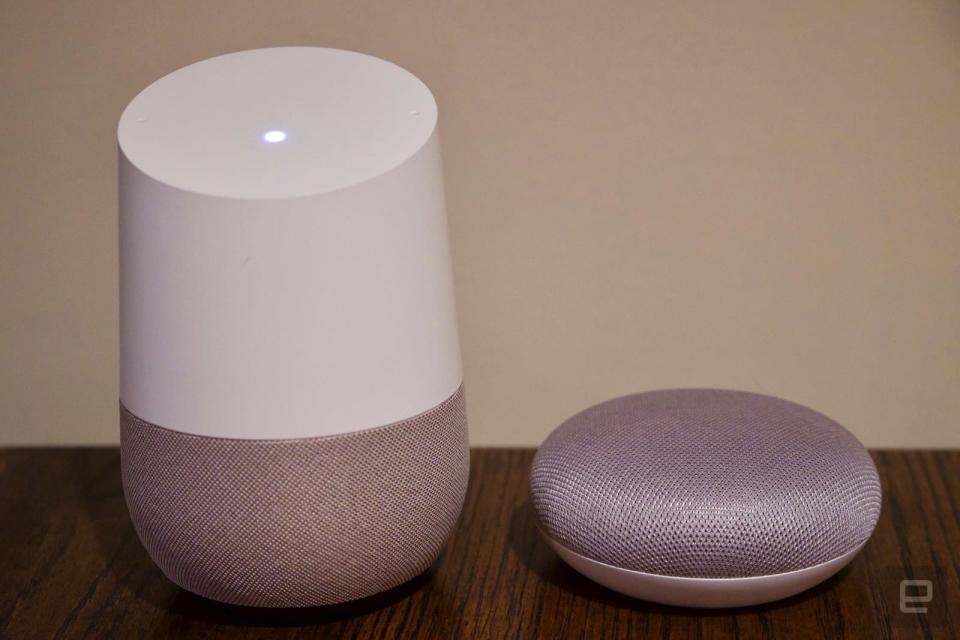
Google describes the Home Mini hardware as a doughnut, and that's not a bad comparison. It's about the same size as my favorite pastry (though there's no hole in the middle). To me, it looks more like someone turned the original Google Home upside down and flattened it. Instead of having a white top and a colored bottom, the Mini offers the opposite. But the top of the Mini is made of a new fabric that Google designed specifically for its pair of new smart speakers (the Mini and its giant brother the Home Max). The soft look of the light gray fabric and the Mini's rounded corners make this a much friendlier gadget than the Echo Dot, and one that I'd be happy to put just about anywhere in my house.
The company says it designed the fabric to be both acoustically and visually transparent, so you can see the Mini's four status lights when it's listening and "thinking." Those lights are much less gaudy than the Echo Dot's bright LED ring, but they're also not quite as good at showing you when the Home is in use. As for the fabric top, one potential downside is that it could get dirtier than a standard plastic shell and won't be as easy to clean. There's also no way to change out the top, whereas the bigger Google Home has a swappable base.
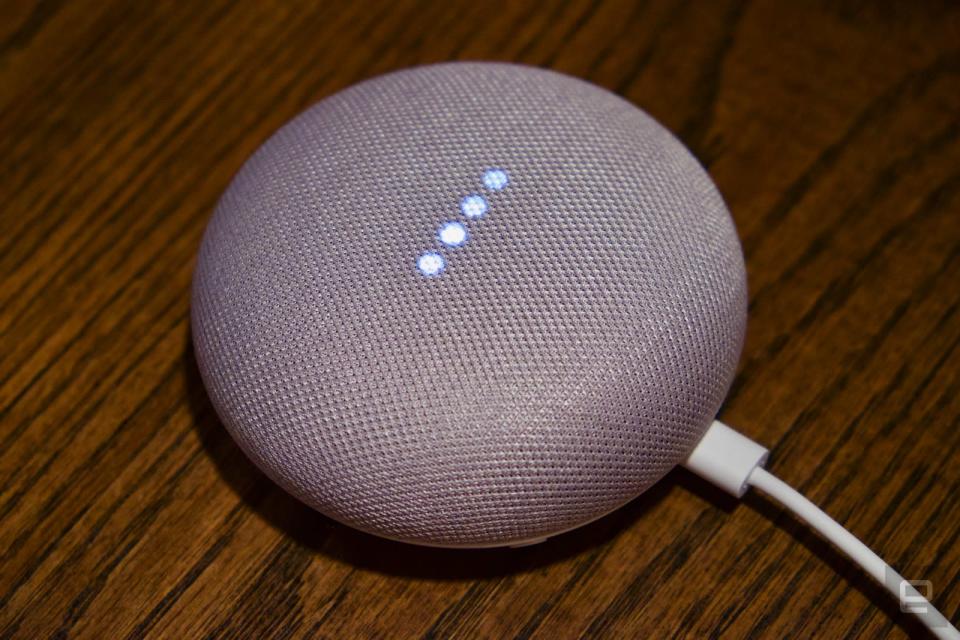
That said, I don't think the Home Mini will get too grimy, because I rarely needed to touch it. Tapping the left or right side of it turns the volume up or down, but it's just as easy to do that with a voice command. Until a few days ago, you could also tap and hold on the center of the Home Mini to activate the Google Assistant, but something went awry with that feature. A few Home Minis were suffering from a bug whereby their touch panels activated inadvertently -- this meant the device was able to record audio and transmit it to Google without a user's consent, a privacy nightmare in the making.
Google quickly disabled the feature, and a review of all the voice commands the Home Mini sent showed no unusual activity for me. I believe this won't be a problem going forward, but it's still something to be aware of if you're on the fence about having a voice assistant in your house. For extra privacy, you can mute the device's microphone with a switch on the back. Once it's muted, the four lights on the top of the Home Mini light up in orange. It's a bit less elegant than the button found on the larger Google Home, but it does the job.
Setup
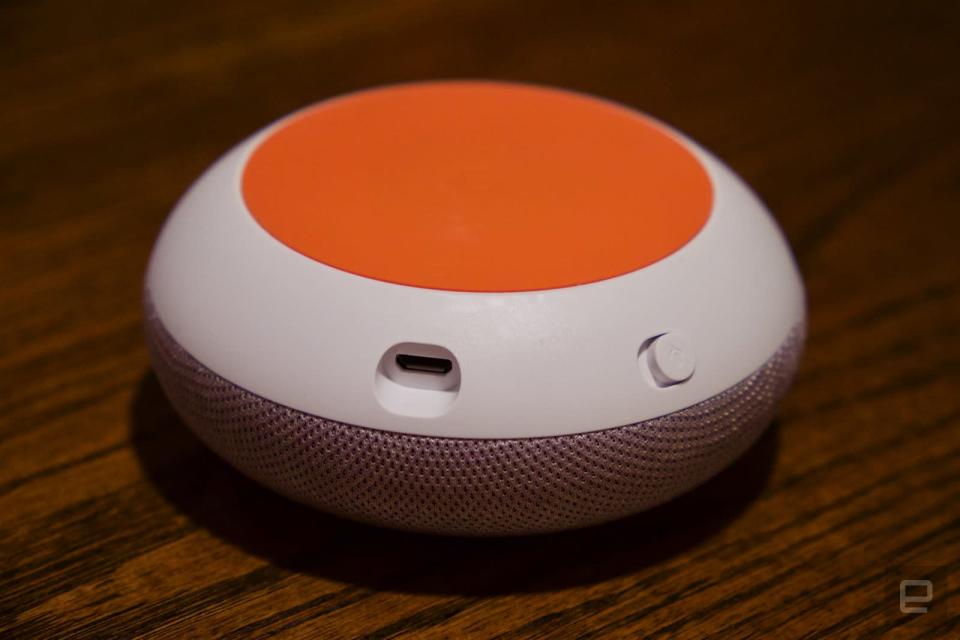
Setting up the Home Mini is identical to setting up the full-size Home. You plug it in, and the Google Home app walks you through the rest. Punch in your WiFi credentials, assign it to a room and you're ready to roll.
But to get the most out of a Google Home, you'll want to customize a few things. In the Home app, you can sign into various music and video services, including Spotify (free or premium), Pandora, TuneIn and IHeartRadio, so that you can tell the Home Mini to play your streaming library. If you use Google-owned services like Play Music and YouTube, they'll be automatically set up. Supported video services include CBS, the CW (both added over the past year) and Netflix.
You can also customize "My Day," a daily briefing that tells you what's on your calendar, what your commute is like and how the weather looks in your area, all pulled from your Google account. It also can follow that up with a quick news program, so it's worth taking a minute to pick your favorite sources. Options include "traditional" news like Bloomberg, NPR and the Wall Street Journal, but you can also get programs focused on specific topics like technology and sports.
In use
Once you're all set up, you can start asking the Home Mini questions and the Google Assistant will answer based on the company's massive knowledge graph. You can also ask it to give you just about any info you've stored in your Google account, like calendar appointments, reminders and your commute, but there's a caveat: It works only with personal Google accounts; G Suite is not supported. That's crazy, particularly a year after the first Home arrived. Even Amazon supports G Suite calendars on the Echo! As someone who uses his work calendar much more than the personal one, I'd really like the Mini to work with G Suite accounts.
The Home Mini can stream audio, video or images from Google Photos to any Chromecast-enabled device (including another Google Home). Controlling audio and video was one of my favorite features with the original Google Home, and that's still the case here. The speaker is too small for dedicated music playback (more on that later), but I used the Mini to cast music and video to various speakers and TVs in my house with no issues.
Additionally, there's a ton of other services you can talk to, across categories like education, productivity, entertainment, games and trivia, news and more. They're similar to Alexa's skills, but you don't have to "enable" these. You can just say, "OK Google, talk to the Wall Street Journal" to get whatever info the publication has posted recently. The best place to see everything you can ask the Google Assistant is currently in the official Assistant app, not the Home app you use for setup. That was a little confusing, but once I had both installed, it was pretty easy to learn more about what the Home Mini was currently capable of.
Other features include getting step-by-step recipe directions from the Food Network, Domino's pizza delivery, calling an Uber and making a reservation with OpenTable. Naturally, the Home Mini can connect to a variety of smart home devices as well. Google says that Home supports 1,000 devices from "more than 100" home automation partners. And you can use IFTTT to build your own custom actions as well. One of the nicer things about the Google Assistant is that you don't need to sign in or set up much before you start using these actions -- I asked the Mini to make me a reservation for dinner tonight and went through the process without having to go back to my phone, which is how it should be.
What's changed
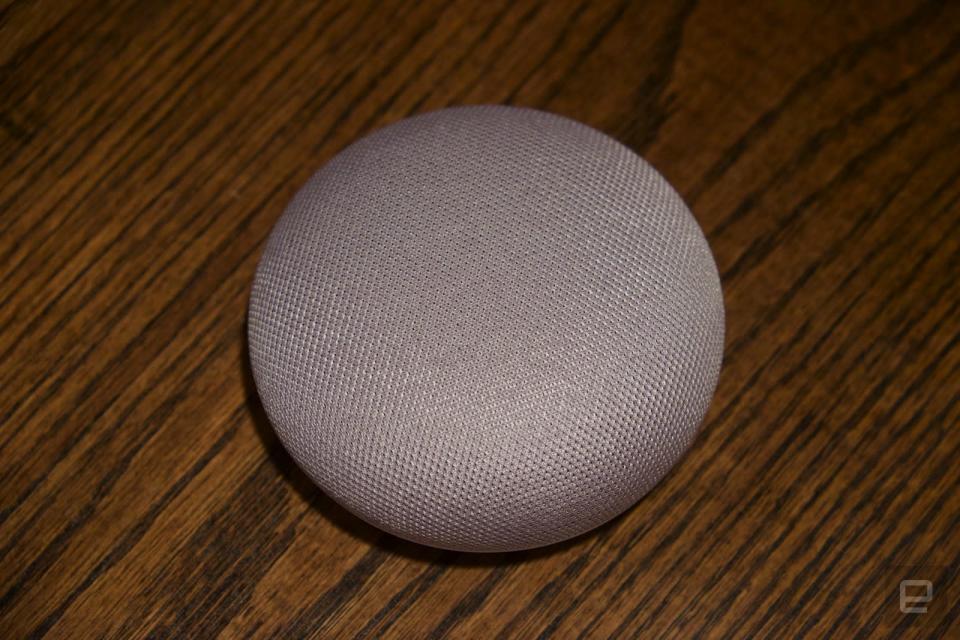
That said, there are some differences to note about the Home Mini as compared with the original, almost all of which come down to one thing: audio quality. Obviously, the much smaller Mini has a much smaller speaker, and that makes a huge difference for audio playback. It works fine for voice responses, alarms, timers and the like, but it's not something you'll want to use for music. The bigger Google Home doesn't have outstanding audio, but it's definitely better than your laptop speakers or most cheaper Bluetooth speakers. The Mini, on the other hand, is severely lacking in the bass department and generally lacks the clarity you'd want for listening to music.
For $49, that's totally excusable, but it's something worth being aware of. For what it's worth,, the Mini absolutely outclasses the Echo Dot in audio quality. The Dot sounds tinny and hollow when Alexa speaks to you, and music playback is even worse. I compared the same songs across both devices, and the Dot consistently came up short, without even a hint of a bass. I personally wouldn't want to use the Home Mini for music, outside of a few limited circumstances -- I could see putting on a few songs while cleaning up the bedroom, for example, but for any longer listening session I'd rather just pop in some headphones than keep the Mini playing. Your milage may vary, of course -- if you listen to a lot of audio through your phone's speaker, the Mini will be an improvement.
The Mini's tiny design also affects microphone performance. The Google Assistant hears me just fine, but voice calling is another story. When I called a few friends with the Mini, they all said that I sounded terrible. At least I could hear things fine on my end. This isn't just a problem with the WiFi calling protocol that Google is using, either. I called the same people on the full-size Google Home and everyone said things sounded significantly better. If you were going to buy a Home product with the intent of using it as a voice-activated speakerphone, you'll be better off springing for the larger model (which costs $129, but is currently on sale for $109).
In addition to voice calls, new Google Assistant features including adding calendar items and reminders (something that really should have been there from day one). Voice Match, which lets multiple users get personalized responses from the Home, is probably the biggest and most useful addition so far. If you want to try shopping with your voice, Google Express now lets you order products from giant retailers like Walmart and Target.
Google also announced a number of new features when it unveiled the Home Mini last week; unfortunately, some of the most notable ones aren't live yet. Users can build "routines" that stack a few actions together the way the My Day briefing gives you a handful of different pieces of info. Saying "Good morning" could turn on lights, set your thermostat, turn on the coffeepot and tell you what's first on your calendar (provided you have the right smart devices to do those things, of course).
Another new feature will let you use the Home devices as an intercom — you'll be able to "broadcast" a message from the Google Assistant (on your phone or through Google Home) to all other Home devices in the house. The Home also lets you send info from it to your phone if you need to see something visual, like directions.
The competition
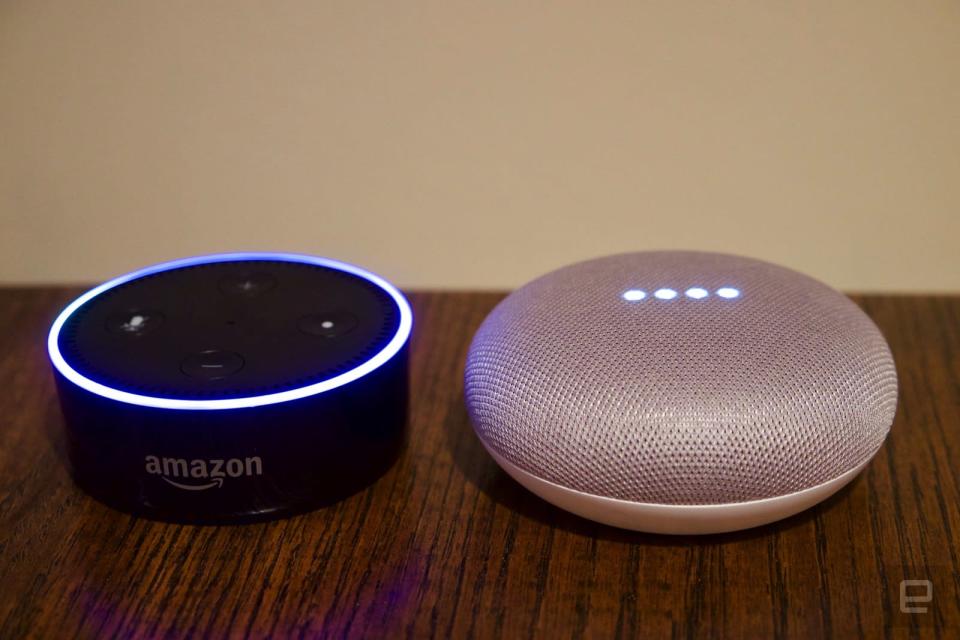
The question everyone will have to ask when considering the Home Mini is how it compares with the Echo Dot. The Mini beats the Dot in terms of audio quality, and I personally prefer its looks. But the Dot still has broader third-party support, with 20,000 "skills" and more added every week. The real question is whether Google supports the smart home products and features that you need. At this point, the Home Mini can control a wide variety of smart home devices -- just not as many as Alexa. Amazon's head start and the fragmented nature of the smart-home-device market gives the Echo a lead, but I'm no longer convinced that going with Amazon is a must for anyone wanting to have the best smart home experience.
If you're deep in Google's ecosystem and prefer using its products and services, the Home Mini is a natural choice -- provided you don't rely heavily on a G Suite account. If you do, the Echo is surprisingly a better option. And Google's implementation of voice calling is much better, but the Mini's terrible call quality negates that advantage.
Wrap-up
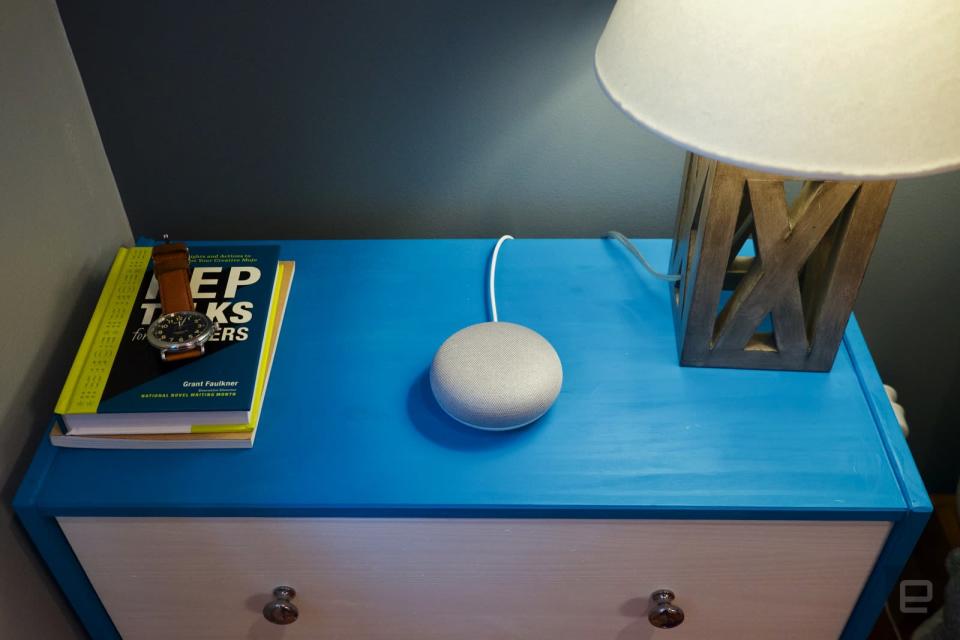
There's no doubt that Google Home's capabilities have improved significantly over the past year. I called the original device "little more than a toy" last year, but now it's a legit competitor to Amazon's Echo and Alexa. The Echo might technically have a lead in compatible devices, but I'd urge you to do some research before committing to a smart speaker -- chances are good that the Home Mini can do what you need it to.
Google's undeniable advantage comes from the amount of info Google has about both the world and your own activities. Its knowledge graph is unrivaled, and Google is very good at answering any query you might have. As for the hardware itself, the Home Mini has a better speaker, a more attractive appearance and superior voice-calling features -- it's just too bad that the microphones don't offer better call quality. Google has done a strong job closing the gap between the Assistant and Alexa over the past 12 months -- as long as the Home Mini works with devices and services you use, it's well worth a look.















